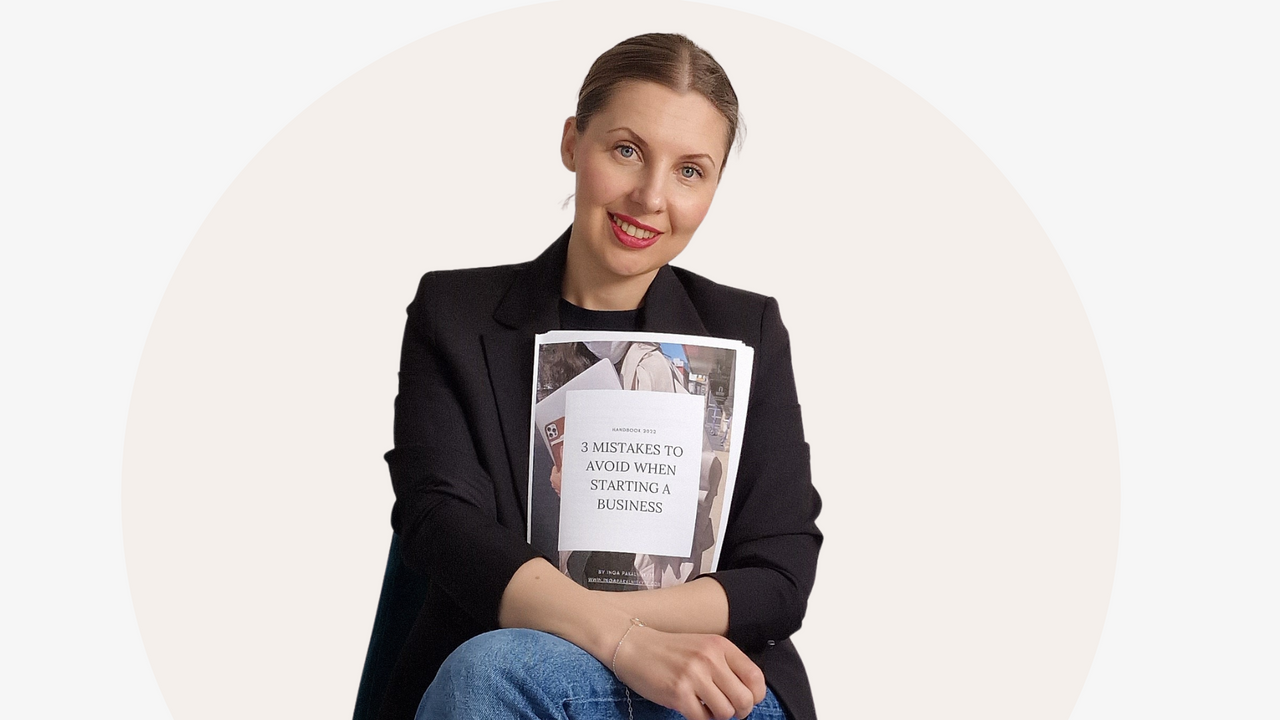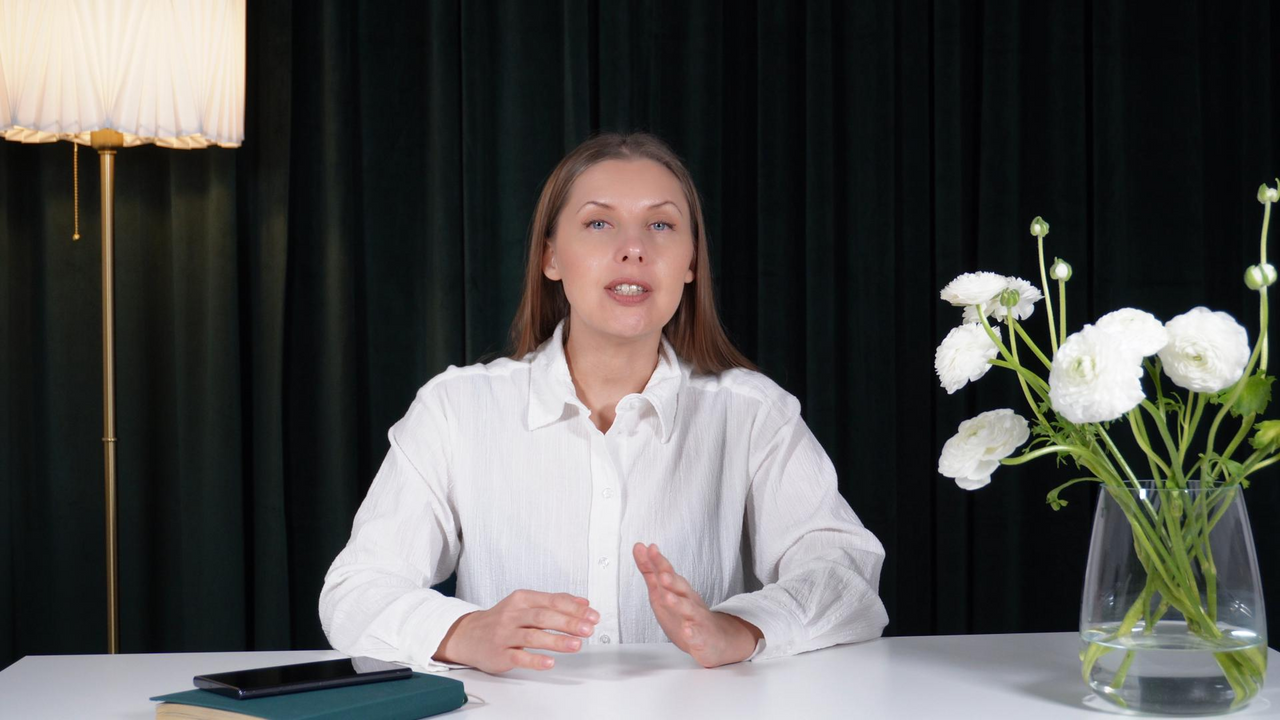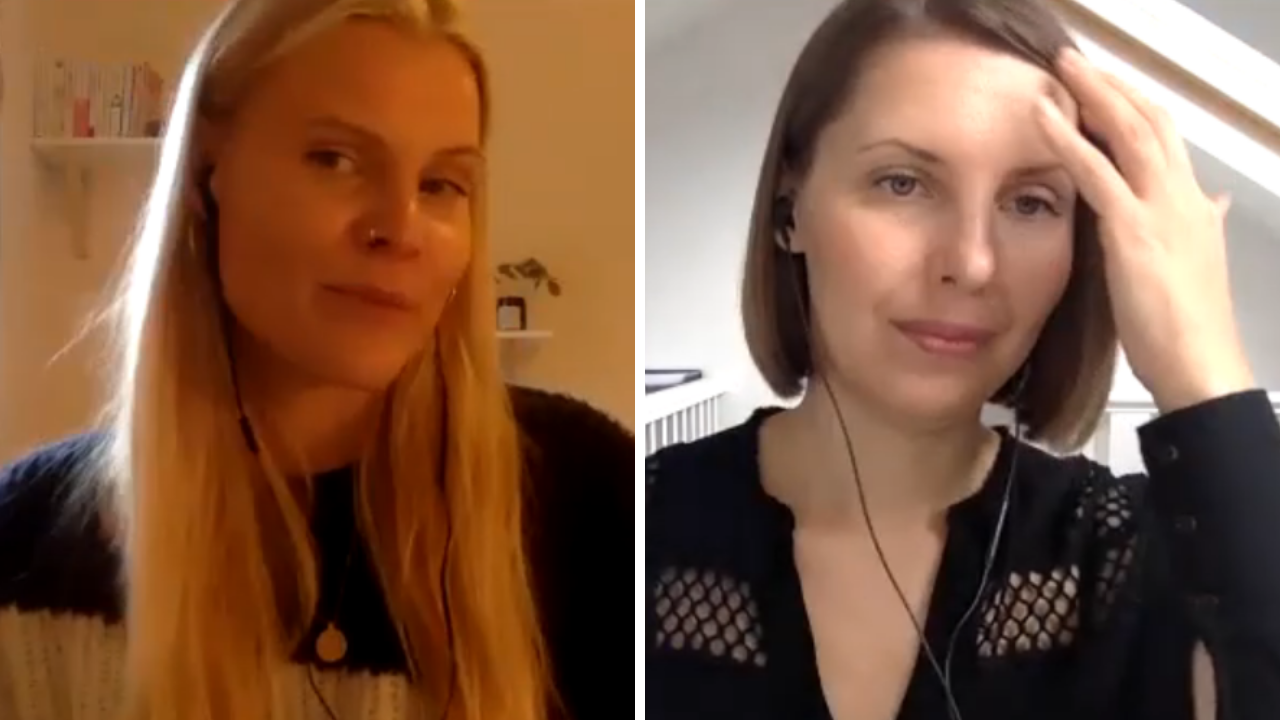How Much Does It Cost To Start A Business?
May 02, 2022
Have a business idea, but no clue how much it would cost to start? You're in the right place.
Starting a business can feel overwhelming, exciting and scary at the same time. (Which is absolutely normal!) And if you are thinking about whether you have what it takes, I am here to tell you: Yes! You do! And… you are ready to start!
Trust me, I know! Over the past 15 years, I've built 3 businesses and helped many people just like you, to start and grow theirs.
There is a lot to take in here, but you don’t have to have it all figured out, to begin with. Starting a business takes time, focus, commitment, consistent learning and taking consistent action.
In this comprehensive guide, I’ll walk you through steps to figure out how much money do you need to start YOUR business:
- Cost of Company Registration
- Cost of Business Licenses/Permits
- Business Insurance
- Business Bank Account Fees
- Payment Merchant Accounts + Payment Processing Fees
- Website Design & Maintenance Costs
- Email Marketing Platform
- Cost of Logo/ Branding
- Costs of Industry-Specific Software
- Staff Expenses
- Business Premises Rent/Lease Cost
- Utilities
- Equipment + Business Vehicles
- Furniture
- Stock or Raw Materials
- Marketing Costs
- Monthly Business Running Costs
Please, bookmark this guide and come back to it as much as you need to.
By the end of this blog post, you'll be able to put all of this into practice by downloading a done-for-you business startup cost calculator spreadsheet.
Let's get started.
Start Up Costs
1. Cost Of Registering a Company
When registering your business yourself, you’ll need to go through Companies House and fill out the required forms. Registering online costs £12, or £40 by post. Should you decide to use accountant services, you can expect to pay +/- £100 for company registration. Also, you can start as a sole trader, which means you don’t have to pay anything to start your business.
2. Business Licences/Permits
The most obvious and common businesses needing licensing are to do with selling food, alcohol, tobacco and gambling. Fees can vary from as little as £20 or go over a few thousand pounds.
3. Business Insurance
There’s only one policy you’re legally required to have as a small business, and that’s employers’ liability insurance (EL). You must get Employers’ Liability (EL) insurance as soon as you become an employer - your policy must cover you for at least £5 million and come from an authorised insurer.
4. Business Bank Account
Even as a sole trader you can and should open a business bank account. Keeping your personal and business money separate is a must!
There are so many different banks, that offer different business accounts to cater for your business needs. When choosing the best bank account, please consider the following: will your business be taking cash payments, bank transfers or online payments. You can start a business bank account for free with Monzo. With other banks, you will need to pay a monthly fee of £5. Plus, you may need to pay an additional fee should you deposit cash payments into your bank account, or even be charged a fee if your Direct Debts bounce back.
Before you choose your business bank account, consider all of the above. There is a big list to choose from, and you should not go for the very first or the cheapest one before checking all the costs.
5. Merchant Accounts + Payment Processing Fees
To take in-person card payments or online payments on your website you will need to open a merchant account. Most of the merchant accounts, such as Stripe and PayPal, have no setup fees or monthly fees. You only have to pay payment processing fees, which means your business gets charged only when you process a payment. For example, Stripe, is charging 1.4% + 20p for European cards, 2.9% + 20p for non-European cards. So if you are taking a payment of £100 with a European card, your processing fee will be £1.4 + 20p = £1.60
6. Website Design & Development Costs
Here’s one myth you need to break right now - most businesses don’t need to hire a web designer to create a business website. Especially if you are a one-man/woman show. Today, it is easier than ever to create your own website and save thousands of pounds in the very beginning. So let’s break down how much it would cost you to start your own website.
Domain Name
A domain name can cost anywhere from just a few pounds to thousands of pounds. But again, it’s not very expensive, the average website domain price is £10 - £30 per year. You can purchase your domain name on GoDaddy, Google Domains.
Website Builder Platform
When getting started, you can expect to pay between £13 - £35 per month. Most of the time, that is enough to get started. Here are my favourite website builder platforms:
For product-based businesses:
Shopify - hands down, the best website builder for businesses that sell physical products. From selling food items, clothes, supplements, accessories and all of the above. It’s more than enough for you to start with a Basic plan, which will cost you £24 per month. They also provide 8 free website templates, which can be enough to get started. Or you can choose to pay for a website template.
For service-based businesses:
Squarespace - user-friendly all-in-one web builder platform. Ideal for any service-based business, or bloggers. I really like this platform, as it is easy to navigate and it has no hidden fees. It offers a large selection of beautiful templates to choose from. If you will be taking online payments via your website, for example, if you will be selling tickets to events, classes or private sessions, I would recommend choosing the “Commerce Plan”, which will cost you £24 per month. I would steer away from the “Business” plan which costs £21 per month because it has additional processing fees of 3%, which is a total rip off and makes no commercial sense.
Wix - is one of the cheapest web building platforms out there. This platform is great for coaches, therapists, personal trainers and fitness professionals, as it offers a built-in booking system and calendar. To get started choose “Business Basic” from the Business and eCommerce Plans. It will cost you £13 per month when paying month-by-month basis. It is a good platform, but not my favourite, as it’s not as user friendly when compared to Squarespace.
For online courses and memberships:
Kajabi - hands down, the best all-in-one platform is out there. It includes 1 website, 3 products (you can sell 3 different online courses), 3 pipelines, unlimited landing pages, unlimited marketing emails, 10,000 contacts, 1,000 active members, 0% transaction fee, online payments and more! The basic plan will cost you $149 per month when paying month-by-month basis.
7. Email Marketing Platform
Don’t get this confused with business email, these are two different things. And you should NEVER use your business email to send bulk emails. If you will do that, you will risk getting your business email domain getting blacklisted. When that happens, your business emails will get suspended by SPAM filters and your clients will not receive ANY emails from you. Basically, don’t do this to yourself, totally not worth it.
If your website is built on Wix - use the Email Marketing “Ascend” by Wix - starting from £0 per month. However, I would suggest starting with the “Basic” plan for £6.95 per month, simply because it includes additional automation (which is essential for any email marketing), plus gives you access to more forms.
If your website is built on Squarespace - us the Email Marketing by Squarespace - starts from £6 per month. But I would suggest choosing the “Core” plan, as it includes automation features.
If your website is built on Shopify - use the native Shopify email marketing platform to get started - it has up to 2500 emails per month included in your monthly subscription. As your business will grow, you can add other marketing platforms from the Shopify App Store.
If your website is built on Kajabi - you already have a build-in robust email marketing platform. So no additional costs here.
8. Business Email
Please do yourself a favour and use Google Workspace for your business email. It provides more than just the email address, but also gives you cloud storage space on Google Drive and access to their additional tools such as Google Calendar, Google Docs, Google Forms, Google Sheets, Google Slides and more. Plus, you can add up to 100 participant video meetings when using Google Meet. One user account will cost you as little as £4.60 per month.
9. Cost of Logo/ Branding
When getting started, I would suggest using Canva to create your own logo. Upgrade to the paid Canva Pro version, so can have the access to countless templates, plus, you can download files with transparent backgrounds and more amazing features. It will cost you £10.99 per month and it is totally worth every penny. You also can cancel and renew your Pro version at any time.
I use Canva for every aspect of my business, as it allows me to create everything I need: guidebooks, social media posts, business cards, logos, favicons, and everything else.
10. Industry-specific Software (+ Hardware)
No matter what industry you’re in, you’ll need industry-specific software, and probably hardware to operate your business. If you are a Brick & Morton business, for example, a restaurant, coffee or a physical shop, you will need a Point Of Sale (POS) software with hardware (your card machines & till systems). You can expect to pay a one-time fee starting from £189 + VAT. (Zettle).
If you are a coach, consultant, therapist or any other professional who is taking client appointments either online or in person, you’ll need a booking system with a basic Customer Relationship Management (CRM). You can use Acuity Scheduling, which can cost you from $15 per month.
If you are in the hospitality or catering industry, you’ll need digital menus, payments, kitchen, queuing, reporting systems and stock management systems. And if you have large teams, you’ll probably need HR systems to help you manage staff rotas. The prices of each can vary drastically depending on your industry, the size of your team and the size of your business.
11. Staff Expenses
If you are starting a company with a few employees, you need to consider how much it will cost to pay the salaries, plus your PAYE tax contributions. Also, think about how you will be paying yourself. There are a few options here: full salary, or minimal salary + dividends. Refer to your accountant for the best advice.
12. Business Premises
For any brick & mortar business, you’ll need to lease premises either for your shop, restaurant, office(s), warehouse, workshop etc. Here prices can vary depending on your business location, square footage, foot flow and everything above. Plus, you may need to pay Business rates.
For any online business, you can start & operate your business from your living room, spare bedroom or any other place in your own home. So there are no additional costs here when starting a business.
13. Utilities
These are your gas, electricity, telephone, broadband connection, waste collection, etc. It’s all about the usage here. Please note, that most of the co-working spaces have all included in your monthly rent. Shop around when looking for your business premises, and see what’s out there.
14. Equipment + Business Vehicles
Make a list of the equipment you need to start your business and list the cost for each item. Some businesses, like hospitality, retail, and personal care will require a much bigger initial investment, rather than an online business or a virtual company.
15. Furniture
Some offices do come with the furniture, so you be able to skip this cost, should that be the case. Most of the coworking spaces offer furnished offices, so it might be worth checking it out. However, if you need furniture for your business, simply make a list of all furniture items you will need and on the same spreadsheet, list the cost of each item.
16. Stock or Raw Materials
If you are selling physical goods, you’ll need to have a starting capital, plus cash on hand to buy your stock, goods or materials in order to sell what your business sells. Here you need to sit down and do the math on what you need to get started, how much that would cost you, and how much money you need to have to refill your stock or goods to keep the business going.
17. Marketing Costs
Marketing is the bloodline of a business, so you will need to spend money to make money. When getting started, I would budget at least £100 per month for marketing costs.
When it comes to marketing, today you have endless options of how to promote your business: run Facebook + Instagram ads, run Google Ads, run ads on Pinterest, get press at your local or industry-specific publications or magazines, podcasting, youtube, influencer marketing and more… To give you an idea on how much Facebook + Instagram ads can cost you, here are some ROI (return on investment) figures from my business: by investing £40 on FB + IG ads followed by 5 email series to support the ad, I have generated new business worth of £600.
18. Other Business Running Costs
- Bookkeeping: Keep on top of invoices, expenses and other outgoings. Remember, you can do this manually or use a platform like QuickBooks or Xero.
- Annual accounts: Present a formal record of your company’s financial performance over a given year. Accountant fees start from £1000 per year, which includes submitting your annual account, VAT returns, and payroll.
- Corporation tax: Every UK company must pay corporation tax on a yearly basis. At the time of writing, the corporation tax rate is set to 19%, which will be reduced to 18% from 1st April 2020.
- Self-assessment: As well as your company tax, you must also fill in a tax return for your personal income. This must be returned by 31st January for the previous period running from 6th to 5th April.
- Income tax rates: There is currently a tax-free allowance of up to £11,850. Salaries of up to £32,000 are taxed at 20%, and anything above this is classed under the “higher rate” band, which is taxed at 40%.
- VAT: No matter what your legal business structure is, you must register for VAT if your annual turnover (revenue) exceeds £85,000. This means you’ll need to charge your customers 20% on top of the existing invoice value.
- PAYE: The income tax of your employees must be calculated and sent to HMRC on their behalf. This includes national insurance contributions.
THE MONEY BREAKDOWN
Here's an estimate of how much it can cost you to start a business taking into consideration that your website, logo and business incorporation will be done by you.
For sole-trader starting an online business
- Website: £50-£150 for monthly website building platform + free template, business email and email marketing platform (if using Shopify, expect to pay for a template a one-of fee ranging between £100-£400)
- Logo/Branding: £10.99
- Legal/Incorporation/Insurance: £0
- Business Bank Account: £0-£15
- Marketing Costs: £100
- Business Consultants/Coaches: starting from £1000
For a limited company starting an online business
- Website: £50-£150 for monthly website building platform + free template, business email and email marketing platform (if using Shopify, expect to pay for a template a one-of fee ranging between £100-£400)
- Logo/Branding: £10.99
- Legal/Incorporation/Insurance: £12-£100
- Business Bank Account: £0-£50
- Marketing Costs: £100
- Stock/Raw Materials: varies for every business
- Business Consultants/Coaches: starting from £1000
For a limited company starting a Brick & Morton business
- Website: £50-£150 for monthly website building platform + free template, business email and email marketing platform (if using Shopify, expect to pay for a template a one-of fee ranging between £100-£400)
- Logo/Branding: £10.99
- Legal/Incorporation/Insurance: £12-£100
- Business Bank Account: £0-£50
- Marketing Costs: £100
- Stock/Raw Materials: varies for every business
- Business Premises Lease: varies for every business
- Business Permits: varies for every business
- Business Consultants/Coaches: starting from £1000
Now download my free business startup budget spreadsheet to calculate how much money you need to start your business.
Speak soon,
Inga

















